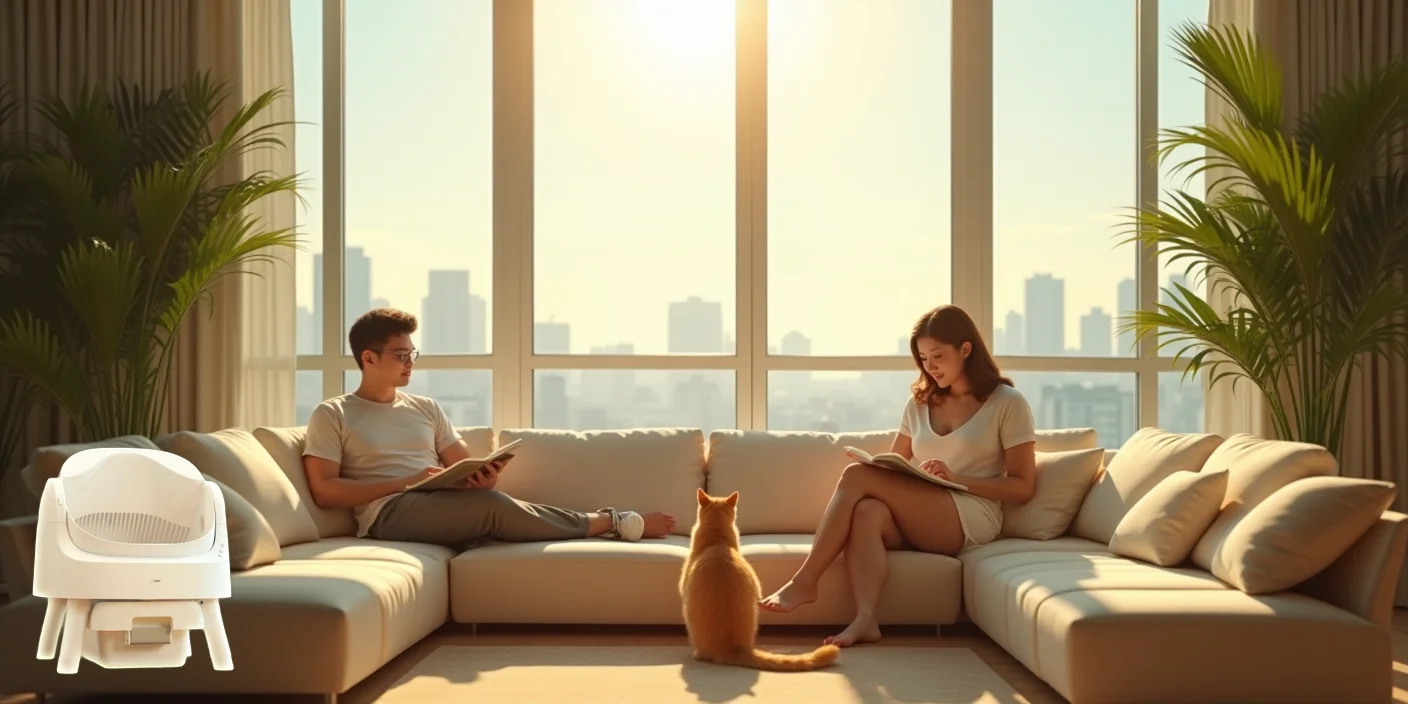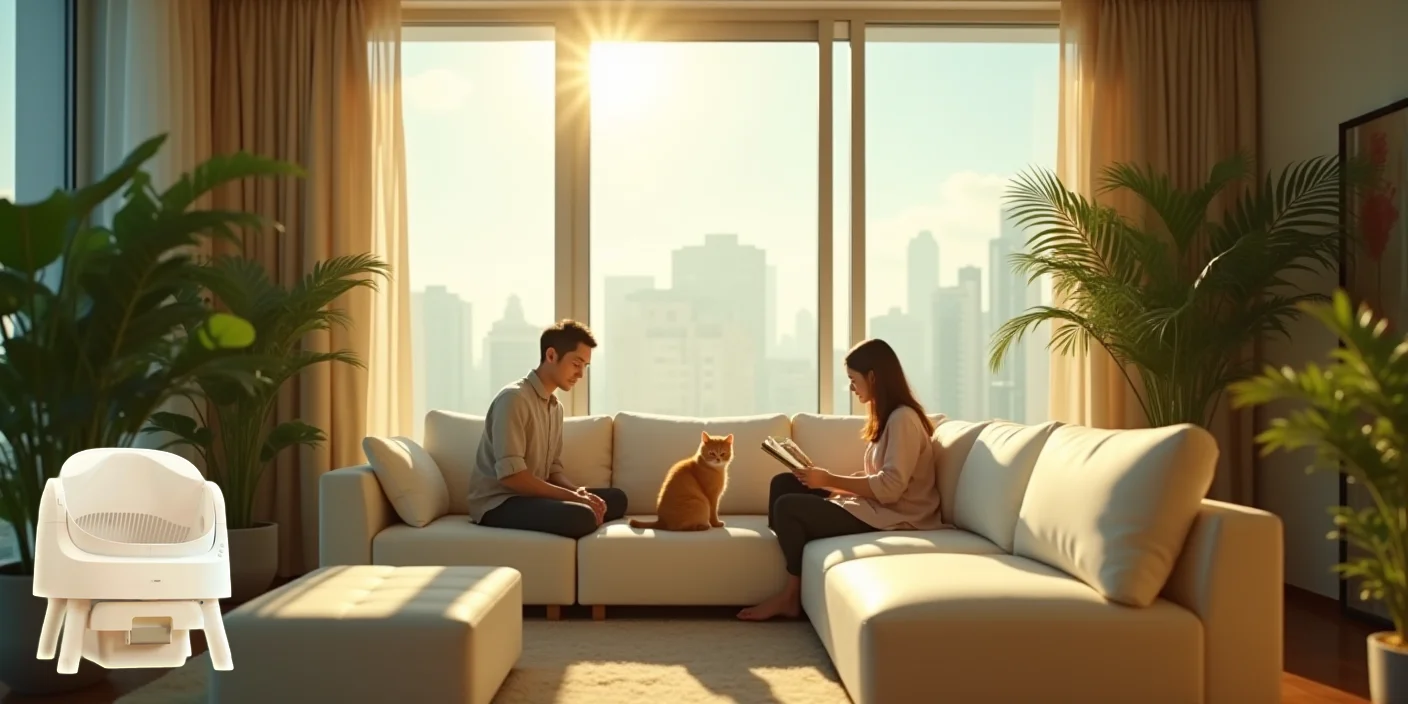Maine Coon Litter Box: Choosing the Right One for Your Gentle Giant
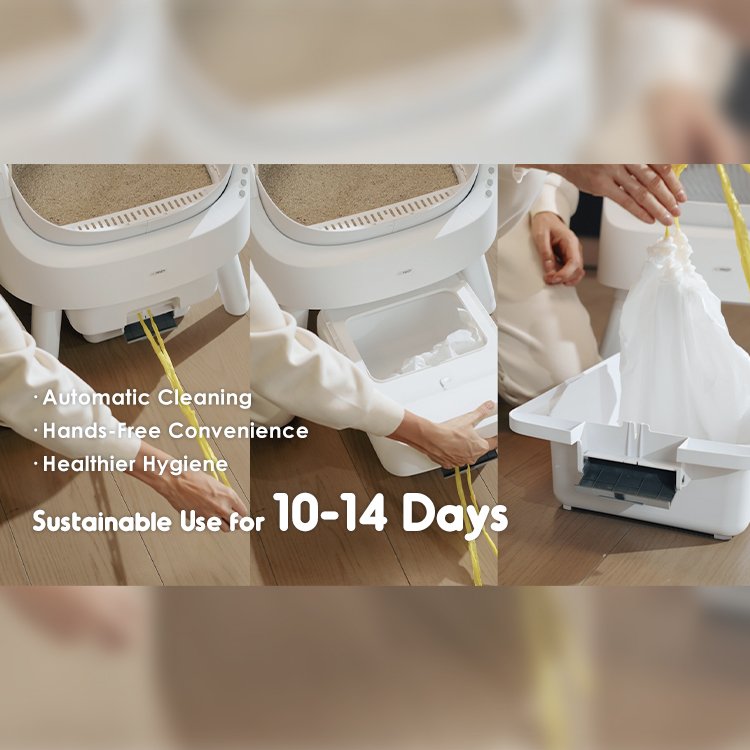
1. Understanding the Size Requirements for Maine Coon Litter Boxes
Maine Coons are significantly larger than average cats, so their litter box needs to accommodate their size. This section explores the specific dimensions and types of large litter boxes that are best suited for these gentle giants.
1.1 Ideal Dimensions and Types of Large Litter Boxes
Choosing the right size and type of litter box is paramount for your Maine Coon’s comfort. Too small, and they’ll feel cramped and uncomfortable. Too shallow, and they might kick litter everywhere. Let’s delve into the specifics.
Key Insights
- Open Top Litter Boxes: Offer easy access and visibility, which some cats prefer. Ensure high sides to contain litter.
- Covered Litter Boxes: Provide privacy and help contain odors, but some cats may feel claustrophobic. Choose a large covered box with ample headroom.
- Top-Entry Litter Boxes: Excellent for containing litter scatter, but may not be suitable for older or less agile Maine Coons.
- Self-Cleaning Litter Boxes: Convenient but can be expensive. Ensure the model is large enough and the cleaning cycle doesn’t startle your cat.
“A happy cat is a cat that feels comfortable and secure, even when using the litter box.” – Dr. Emily Carter, Feline Behaviorist
FAQ:
Maine Coon Litter Box Size
1. **Spacious and sturdy,** this Maine Coon-sized litter box accommodates even the largest cats with ease, ensuring comfortable and mess-free use.
Choosing the Right Box
2. **Designed for giants,** this extra-large litter box provides ample space for Maine Coons to comfortably relieve themselves, minimizing litter scatter.
Litter Box Preferences
3. **Say goodbye to litter spills!** This generously sized litter box, perfect for Maine Coons, features high sides and a wide entry for easy access and reduced mess.
Avoiding Maine Coon Messes
4. **Extra-large capacity, minimal cleaning,** this Maine Coon litter box is built for larger breeds, holding significantly more litter than standard boxes and minimizing frequent cleanings.
- Q: What happens if the litter box is too small? A: Your Maine Coon may avoid using it, leading to accidents outside the box.
- Q: Is a covered litter box always better? A: Not necessarily. Some cats prefer open boxes. Observe your cat’s preferences.
- Q: How often should I clean the litter box? A: At least once a day, and more frequently if you have multiple cats.
- Q: My Maine Coon is older. What type of litter box is best? A: A low-entry litter box or one with a ramp is ideal for senior cats.
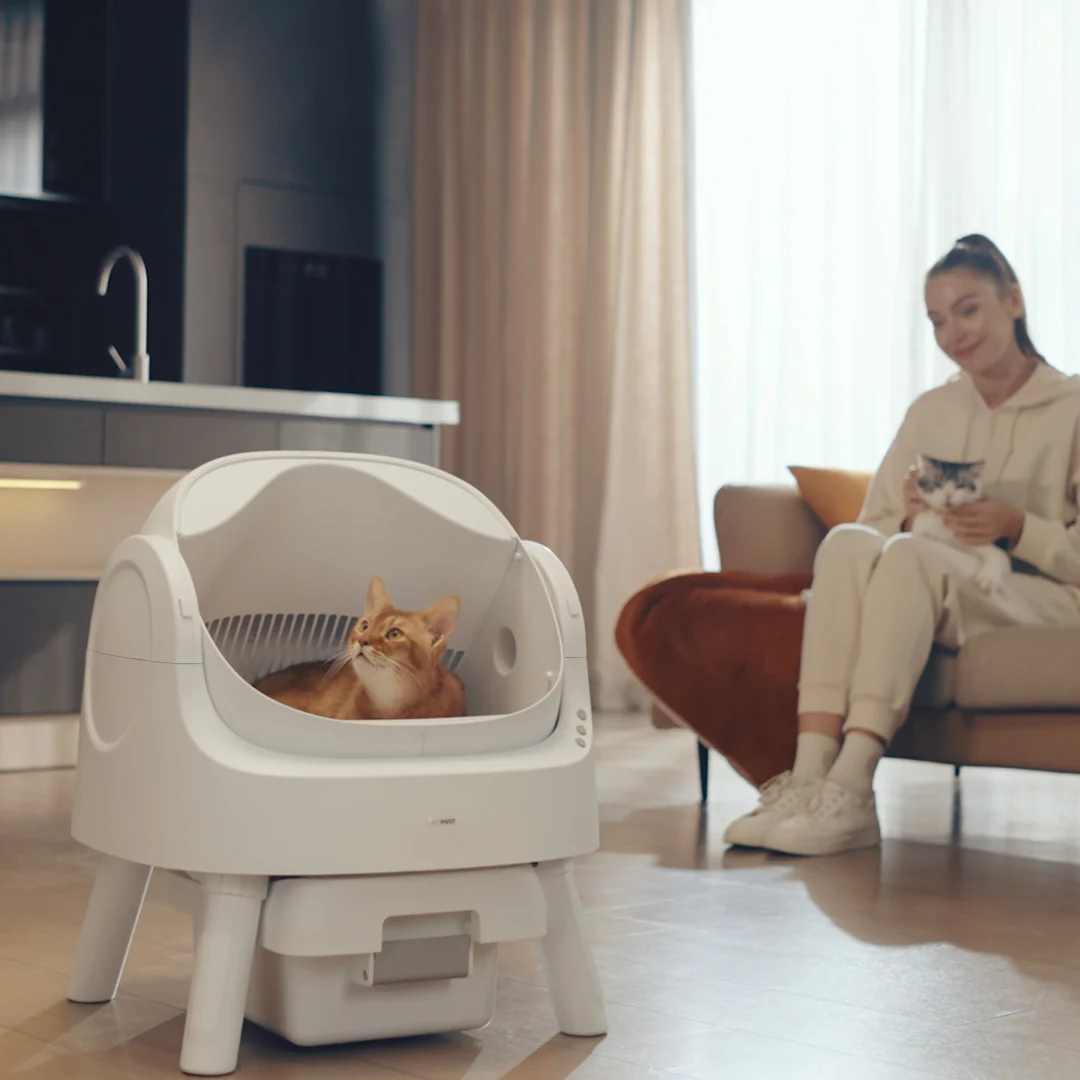
Statistics: A study by the American Association of Feline Practitioners found that 70% of cats prefer larger litter boxes over smaller ones.
1.2 Material and Durability Considerations
The material of the litter box impacts its durability, ease of cleaning, and odor control. Investing in a high-quality, durable litter box will save you money and hassle in the long run.
- Plastic: The most common and affordable option. Look for BPA-free, durable plastic.
- Stainless Steel: A more hygienic and durable option. Resists odors and is easy to sanitize.
- Heavy-Duty Plastic: A good compromise between affordability and durability.
“Choosing a litter box made of durable material is an investment in your cat’s long-term comfort and hygiene.” – Sarah Johnson, Cat Product Reviewer
FAQ:
- Q: How can I prevent plastic litter boxes from absorbing odors? A: Clean them regularly with a mild detergent and avoid harsh chemicals.
- Q: Are stainless steel litter boxes worth the extra cost? A: If you prioritize hygiene and durability, yes.
- Q: How often should I replace a plastic litter box? A: Every 1-2 years, or sooner if it becomes damaged or heavily soiled.
Practical Advice: Look for litter boxes with rounded corners for easier cleaning and to prevent bacteria buildup.
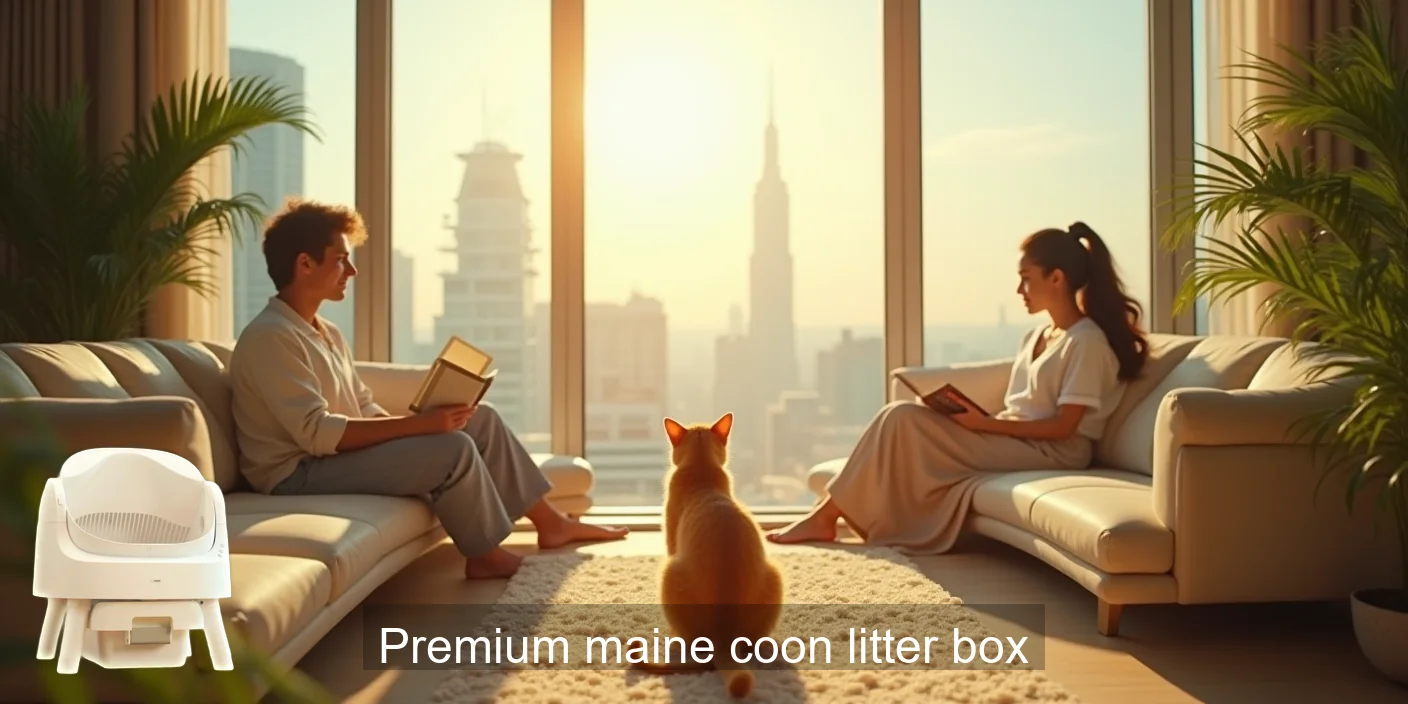
Statistics: A survey of cat owners revealed that 60% prefer plastic litter boxes due to their affordability and ease of cleaning, while 30% prefer stainless steel for its durability and odor resistance.
2. Choosing the Right Litter for Your Maine Coon
The type of litter you choose is just as important as the litter box itself. Maine Coons can be picky about their litter, and the wrong type can lead to litter box aversion. This section explores the best litter options for Maine Coons.
2.1 Types of Litter and Their Suitability for Maine Coons
From clumping clay to natural alternatives, the litter market is vast. Understanding the pros and cons of each type will help you make the best choice for your Maine Coon.
- Clumping Clay Litter: A popular choice due to its affordability and ease of use. Look for low-dust formulas to minimize respiratory irritation.
- Non-Clumping Clay Litter: Less common but can be a good option for cats who don’t bury their waste. Requires more frequent changes.
- Crystal Litter: Excellent for odor control and low dust, but some cats may find the texture unpleasant.
- Natural Litters: Environmentally friendly and often low-dust. Experiment to find one your Maine Coon likes.
“The best litter is the one your cat consistently uses without hesitation.” – Dr. Lisa Peterson, Veterinarian
FAQ:
- Q: My Maine Coon is sneezing after using the litter box. What should I do? A: Switch to a low-dust litter.
- Q: How do I transition my cat to a new type of litter? A: Gradually mix the new litter with the old litter over a week or two.
- Q: Is scented litter a good idea? A: Avoid scented litters, as they can be irritating to cats.
Practical Advice: Start with a small bag of a new litter type to see if your Maine Coon accepts it before buying a large quantity.
Statistics: A study published in the Journal of Feline Medicine and Surgery found that cats are more likely to use a litter box with a litter type they prefer.
2.2 Litter Depth and Maintenance
Maintaining the correct litter depth and cleaning schedule is crucial for your Maine Coon’s comfort and hygiene. This section provides guidelines for optimal litter box maintenance.
- Litter Depth: Maintain a depth of 3-4 inches to allow your Maine Coon to dig and bury their waste comfortably.
- Scooping Frequency: Scoop the litter box at least once daily to remove solid waste and clumps.
- Full Litter Change: Completely empty and clean the litter box every 2-4 weeks, depending on the litter type and the number of cats using it.
- Litter Box Cleaning: Wash the litter box with mild soap and water every 2-4 weeks to prevent bacteria buildup and odor.
“Regular litter box maintenance is essential for preventing litter box aversion and maintaining a healthy environment for your cat.” – Dr. Thomas Brown, Cat Behavior Specialist
FAQ:
- Q: How do I prevent odors from the litter box? A: Scoop frequently, use a high-quality litter, and consider an odor-absorbing litter box liner.
- Q: Can I use bleach to clean the litter box? A: Avoid using bleach, as it can be harmful to cats. Use mild soap and water instead.
- Q: How do I dispose of used litter? A: Check your local regulations for proper disposal methods.
Practical Advice: Use a dedicated scoop and trash can for litter box maintenance to prevent cross-contamination.
Statistics: A survey of cat owners found that those who scoop the litter box daily are less likely to experience litter box problems with their cats.
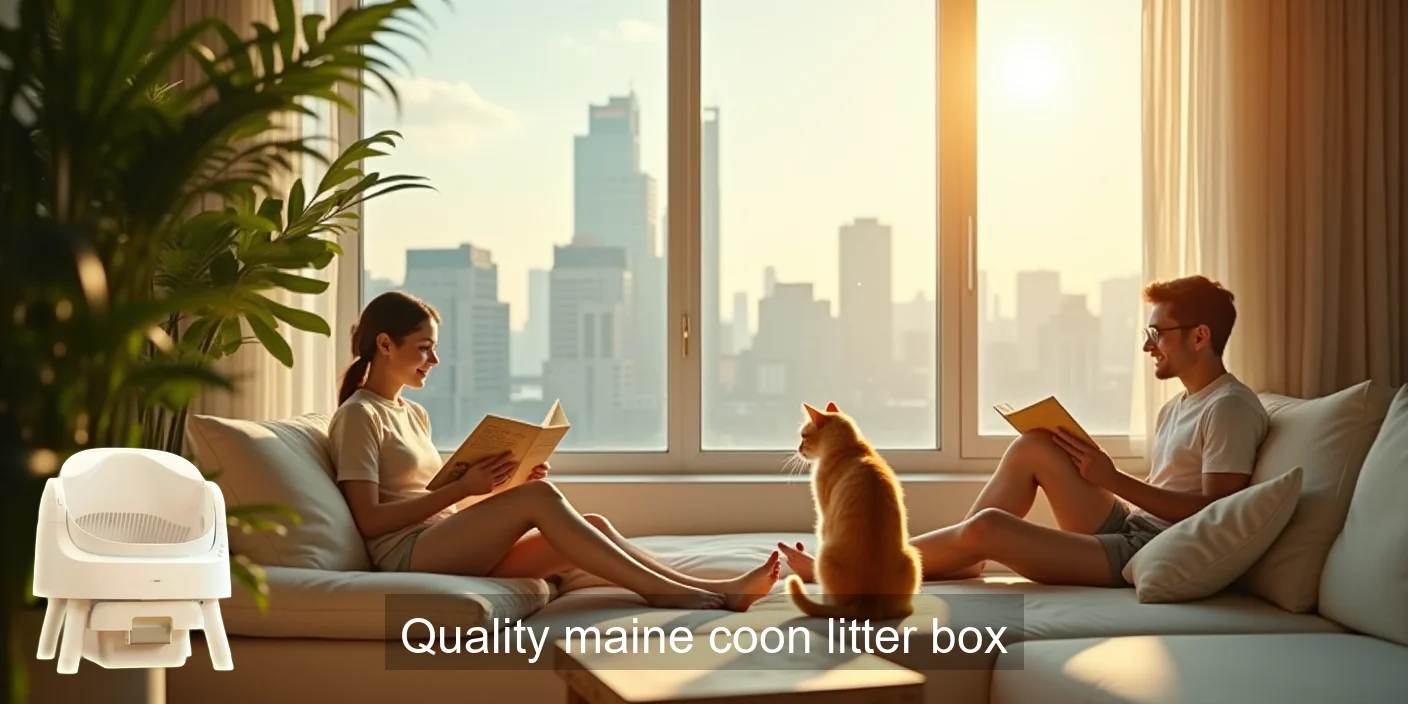
3. Optimal Litter Box Placement for Maine Coons
Where you place the litter box is just as important as the box itself. Maine Coons, like all cats, prefer a quiet, private, and easily accessible location. This section explores the best placement strategies for Maine Coon litter boxes.
Maine Coon Litter Box Size
1. **Spacious and deep:** Designed for Maine Coon’s large size and digging habits, this litter box offers ample room for comfort and minimizes litter scatter.
Choosing the Right Litter
2. **High sides & low entry:** Keeps litter contained while still allowing easy access for your long-haired Maine Coon.
Box Placement & Access
3. **Extra-large capacity:** Holds significantly more litter than standard boxes, reducing the frequency of cleaning for multi-cat households or big Maine Coons.
Cleaning & Maintenance
4. **Durable and easy to clean:** Made from robust materials to withstand active cats, and featuring a smooth, easy-to-wipe surface for quick cleaning.
Your Pets Deserves This Litter Box!
3.1 Ideal Locations and Number of Litter Boxes
The location and number of litter boxes can significantly impact your Maine Coon’s litter box habits. Let’s explore the best practices for creating a comfortable and convenient toileting environment.
- Number of Litter Boxes: The general rule is one litter box per cat, plus one extra. This ensures that each cat has access to a clean litter box, even if one is temporarily unavailable.
- Ideal Locations: Choose quiet, low-traffic areas where your Maine Coon feels safe and secure. Avoid placing the litter box near food and water bowls, as cats prefer to keep these areas separate.
- Avoid: Avoid placing the litter box in loud areas, high-traffic zones, or near appliances that may startle your cat.
“Cats are creatures of habit and prefer consistency. Choose a litter box location and stick with it.” – Dr. David Roberts, Feline Veterinarian
FAQ:
- Q: I only have one cat. Do I still need two litter boxes? A: It’s recommended, as it provides your cat with a choice and can prevent litter box aversion.
- Q: Can I put the litter box in the basement? A: Only if the basement is easily accessible and not too cold or damp.
- Q: My cat is having accidents outside the litter box. Could the location be the problem? A: Yes, the location could be a contributing factor. Try moving the litter box to a different area.
Practical Advice: If you have a multi-story home, place a litter box on each floor.
Statistics: A study by the University of California, Davis, found that cats are more likely to use a litter box that is located in a quiet and private area.
3.2 Accessibility Considerations for Maine Coons
Maine Coons, especially older ones, may have mobility issues. Ensuring the litter box is easily accessible is crucial for their comfort and well-being.
- Entry Height: Choose a litter box with a low entry for kittens and senior Maine Coons who may have difficulty jumping.
- Obstacles: Ensure there is a clear path to the litter box, free from obstacles that could hinder your cat’s access.
- Lighting: Provide adequate lighting near the litter box to prevent accidents, especially at night.
“Accessibility is key, especially for senior cats. Make sure the litter box is easy to reach and use.” – Dr. Susan Miller, Geriatric Veterinarian
FAQ:
Litter Box Metrics
- Q: My Maine Coon is having trouble getting into the litter box. What can I do? A: Consider a litter box with a lower entry or a ramp.
- Q: Is it okay to put the litter box in a small, enclosed space? A: Only if the space is well-ventilated and your cat feels comfortable in enclosed areas.
- Q: How can I make the litter box area more appealing to my cat? A: Keep it clean, quiet, and easily accessible.
Practical Advice: Place a non-slip mat in front of the litter box to help your Maine Coon gain traction.
Statistics: A survey of senior cat owners found that 80% reported improved litter box habits after making accessibility modifications.
4. Addressing Litter Box Problems in Maine Coons
Even with the perfect litter box setup, Maine Coons can sometimes develop litter box problems. Understanding the potential causes and solutions is essential for maintaining a happy and healthy relationship with your feline friend. This section provides guidance on troubleshooting common litter box issues.
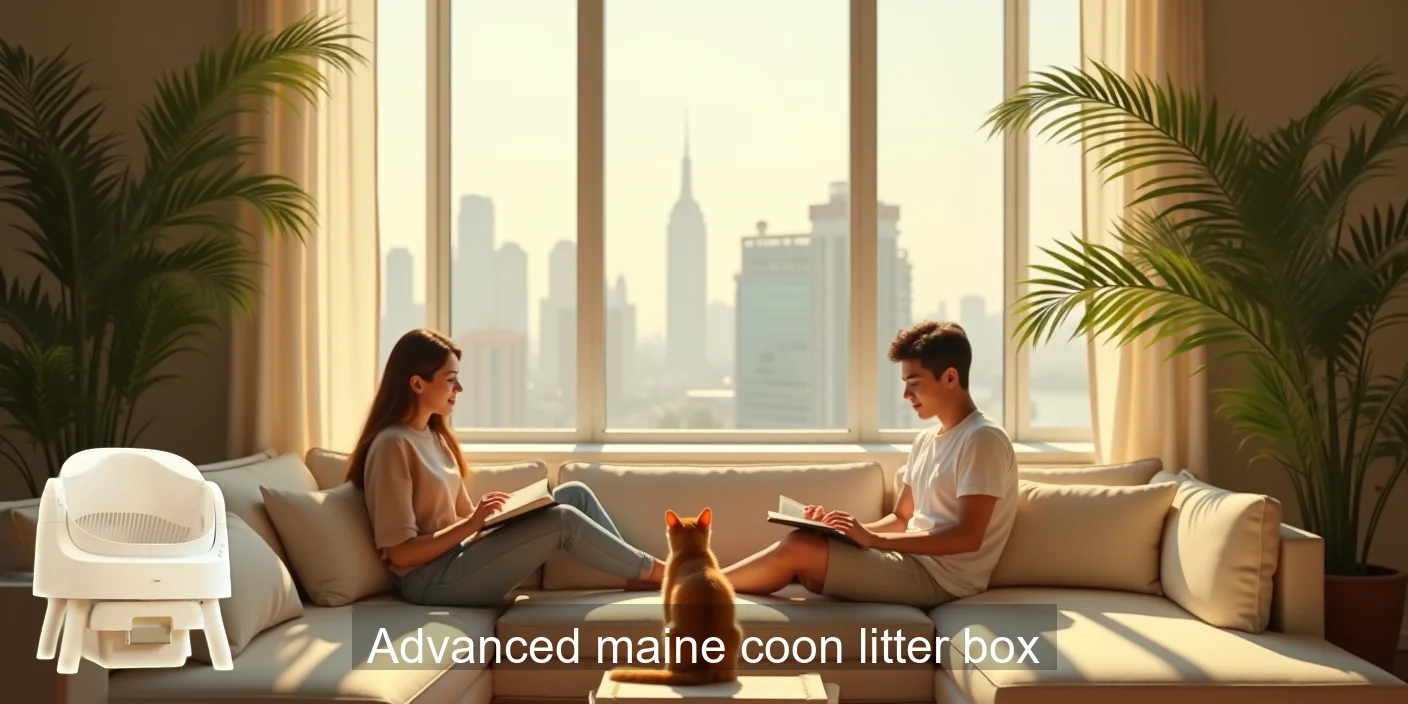
4.1 Identifying Potential Causes of Litter Box Aversion
Litter box aversion can stem from various factors, ranging from medical issues to environmental stressors. Identifying the root cause is the first step towards resolving the problem.
- Medical Issues: Urinary tract infections, kidney disease, and arthritis can make it painful or difficult for your Maine Coon to use the litter box. Consult with your veterinarian to rule out any underlying medical conditions.
- Litter Box Issues: A litter box that is too small, dirty, or located in a stressful area can lead to litter box aversion. Ensure the litter box is appropriately sized, clean, and located in a quiet, private area.
- Stress and Anxiety: Changes in the household, such as a new pet or a move, can cause stress and anxiety, leading to litter box problems. Provide your Maine Coon with a safe and secure environment and consider using calming aids, such as pheromone diffusers.
“Litter box problems are often a sign of an underlying issue. Don’t ignore them; investigate and address the root cause.” – Dr. Jennifer Smith, Veterinary Behaviorist
FAQ:
- Q: How do I know if my cat’s litter box problem is medical? A: Look for signs such as straining to urinate, blood in the urine, or frequent trips to the litter box. Consult with your veterinarian.
- Q: My cat is suddenly avoiding the litter box. What should I do? A: Rule out medical issues first, then assess the litter box setup and environment.
- Q: Can stress cause litter box problems? A: Yes, stress and anxiety are common causes of litter box aversion.
Practical Advice: Keep a journal of your cat’s litter box habits to help identify patterns and potential triggers.
Statistics: A study published in the Journal of Veterinary Behavior found that medical issues are responsible for approximately 30% of litter box problems in cats.
4.2 Solutions and Prevention Strategies
Once you’ve identified the cause of the litter box problem, you can implement targeted solutions and prevention strategies to help your Maine Coon return to healthy litter box habits.
- Veterinary Care: If a medical issue is identified, follow your veterinarian’s recommendations for treatment.
- Litter Box Adjustments: Make necessary adjustments to the litter box setup, such as increasing the size, improving cleanliness, relocating the box, or changing the litter type.
- Stress Reduction: Create a safe and secure environment for your Maine Coon and consider using calming aids, such as pheromone diffusers or calming supplements.
“Consistency, patience, and a proactive approach are key to resolving litter box problems in cats.” – Dr. Michael Davis, Feline Behavior Consultant
Maine Coon Litter Box Size
1. **Spacious and deep:** Plenty of room for your Maine Coon’s large body and long tail, minimizing litter scatter. Keeps things cleaner, longer.
Choosing the Right Litter
2. **Extra-large capacity:** Holds significantly more litter than standard boxes, reducing the frequency of scooping for multi-cat households or large breeds like Maine Coons.
Box Placement & Access
3. **Low entry sides:** Easy access for senior Maine Coons or those with joint issues. Designed to accommodate their size and potential mobility limitations.
Cleaning & Maintenance
4. **High sides and covered top (optional):** Contains litter splatter effectively, keeping your home cleaner and reducing the odor. Ideal for Maine Coons who like to dig.
FAQ:
- Q: How long will it take to resolve a litter box problem? A: It depends on the underlying cause and the effectiveness of the treatment or adjustments. Be patient and consistent.
- Q: Should I punish my cat for having accidents outside the litter box? A: Never punish your cat, as this will only worsen the problem.
- Q: When should I seek professional help for a litter box problem? A: If you’ve tried various solutions without success, consult with a veterinary behaviorist or a certified cat behavior consultant.
Practical Advice: Clean up accidents outside the litter box thoroughly with an enzymatic cleaner to remove odors and prevent repeat offenses.
Statistics: A study by the American Society for the Prevention of Cruelty to Animals (ASPCA) found that early intervention and consistent management are crucial for resolving litter box problems in cats.
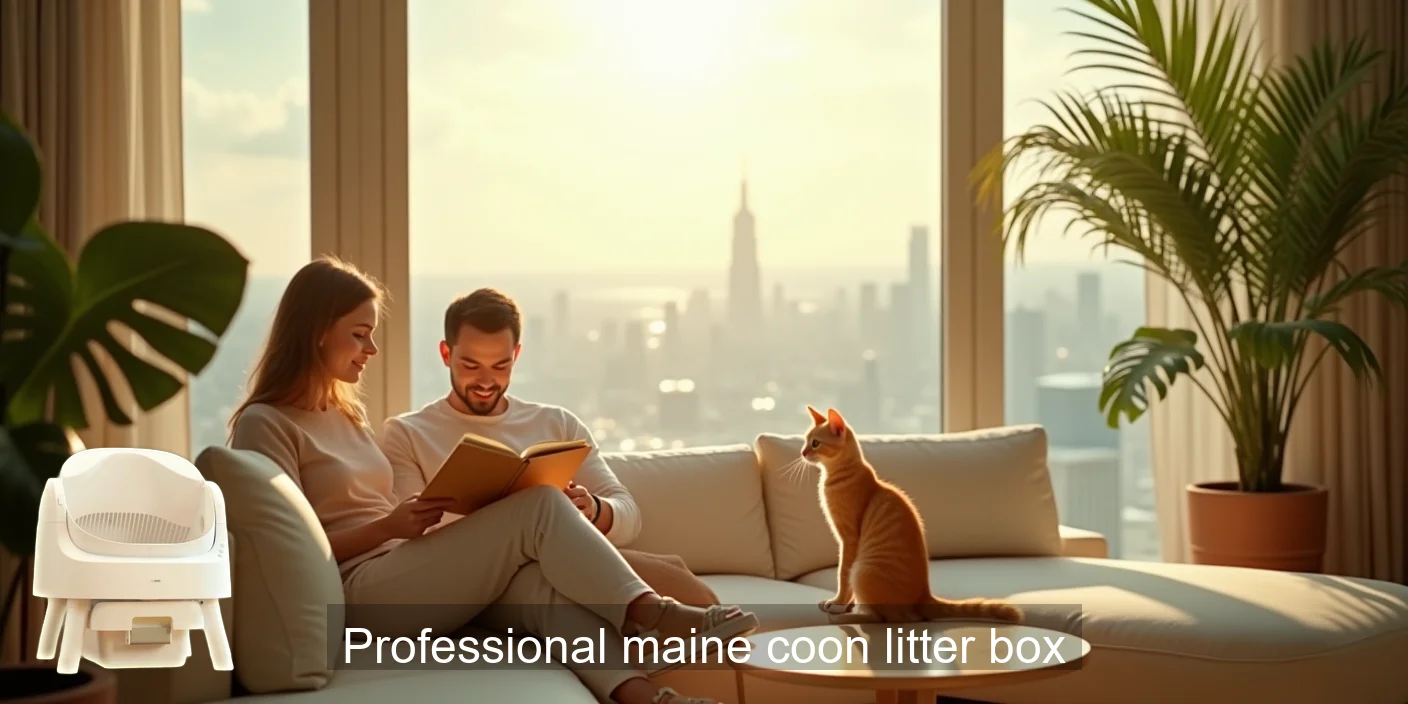
Conclusion
Choosing the right Maine Coon litter box is an essential part of providing a happy and healthy life for your gentle giant. Remember that size matters, and a large litter box is a must. Consider the material, litter type, and placement carefully to create a comfortable and convenient toileting environment. Be proactive in maintaining the litter box and addressing any potential problems promptly. By following the guidelines outlined in this subpage, you can ensure that your Maine Coon has a positive litter box experience, leading to a happier cat and a cleaner home. Don’t wait until problems arise; invest in the right litter box setup today! Browse our selection of large litter boxes and find the perfect fit for your Maine Coon. Your furry friend will thank you for it!
Ready to find the perfect Maine Coon litter box? Shop our Large Litter Box Collection Now!

